Related Research Articles
The 1300s was a decade of the Julian Calendar that began on 1 January 1300 and ended on 31 December 1309.
The 1310s was a decade of the Julian Calendar which began on January 1, 1310, and ended on December 31, 1319.
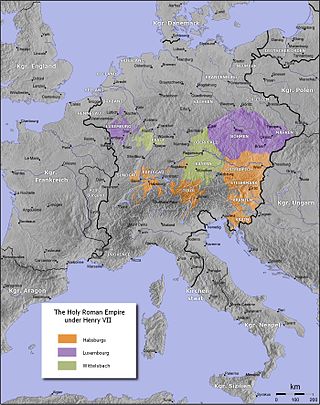
Year 1313 (MCCCXIII) was a common year starting on Monday of the Julian calendar.

Year 1308 (MCCCVIII) was a leap year starting on Monday of the Julian calendar.
The 1290s was a decade of the Julian Calendar which began on January 1, 1290, and ended on December 31, 1299.
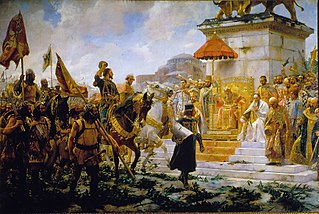
Year 1303 (MCCCIII) was a common year starting on Tuesday of the Julian calendar.
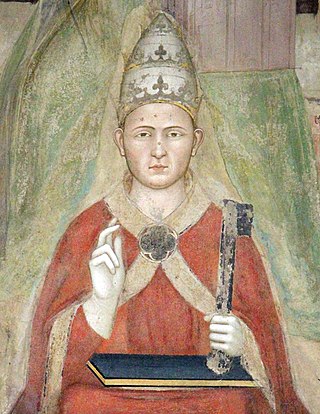
Year 1305 (MCCCV) was a common year starting on Friday of the Julian calendar.

Year 1310 (MCCCX) was a common year starting on Thursday of the Julian calendar.

Year 1316 (MCCCXVI) was a leap year starting on Thursday of the Julian calendar.

Year 1292 (MCCXCII) was a leap year starting on Tuesday of the Julian calendar.
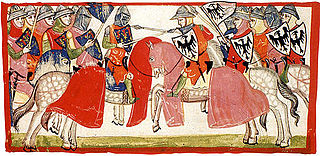
Year 1266 (MCCLXVI) was a common year starting on Friday of the Julian calendar.

John Balliol or John de Balliol, known derisively as Toom Tabard, was King of Scots from 1292 to 1296. Little is known of his early life. After the death of Margaret, Maid of Norway, Scotland entered an interregnum during which several competitors for the Crown of Scotland put forward claims. Balliol was chosen from among them as the new King of Scotland by a group of selected noblemen headed by King Edward I of England.
The Battle of Dunbar was the only significant field action of the campaign of 1296 during the beginning of the First War of Scottish Independence.

Robert II was King of Scots from 1371 to his death in 1390. The son of Walter Stewart, 6th High Steward of Scotland, and Marjorie, daughter of King Robert the Bruce, he was the first monarch of the House of Stewart. Upon the death of his uncle David II, Robert succeeded to the throne.

The title Earl of Moray, or Mormaer of Moray, was originally held by the rulers of the Province of Moray, which existed from the 10th century with varying degrees of independence from the Kingdom of Alba to the south. Until 1130 the status of Moray's rulers was ambiguous and they were described in some sources as "mormaers", in others as "Kings of Moray", and in others as "Kings of Alba". The position was suppressed by David I of Scotland some time after his defeat of Óengus of Moray at the Battle of Stracathro in 1130, but was recreated as a feudal earldom by Robert the Bruce and granted to Thomas Randolph, 1st Earl of Moray in 1312.

Berwick Castle is a ruined castle in Berwick-upon-Tweed, Northumberland, England.
Events from the 1290s in England.
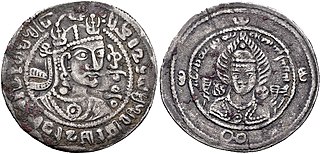
The Khalaj are a Turkic ethnic group who mainly reside in Iran. In Iran they still speak the Khalaj language, although most of them are Persianized.
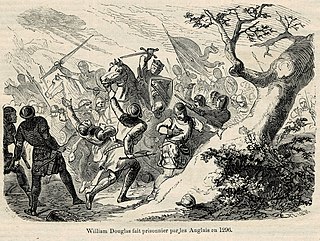
The sack of Berwick was the first significant battle of the First War of Scottish Independence in 1296.
The English invasion of Scotland of 1296 was a military campaign undertaken by Edward I of England in retaliation to the Scottish treaty with France and the renouncing of fealty of John, King of Scotland and Scottish raids into Northern England.
References
- ↑ Marshall, Andrew (April 4, 2013). "Andrew Marshall: Berwick Massacre must be remembered too". The Berwickshire News. Archived from the original on February 23, 2019. Retrieved February 22, 2019.
- ↑ "Monuments, Sites and Cultural Landscape of Chiang Mai, Capital of Lanna". UNESCO World Heritage Centre. September 2, 2015. Retrieved February 22, 2019.
- ↑ Historic Environment Scotland. "Battle of Dunbar I (BTL31)" . Retrieved June 19, 2020.
- ↑ Miller, James (1859). The History of Dunbar: From the Earliest Records to the Present Time: with a Description of the Ancient Castles and Picturesque Scenery on the Borders of East Lothian. London: James Downie. pp. 28–30.
- 1 2 Chaurasia, Radhey Shyam (2002). History of Medieval India: From 1000 A.D. to 1707 A.D. New Delhi: Atlantic Publishers & Distributors. p. 31. ISBN 9788126901234.
- ↑ S. B. Bhattacherje, Encyclopaedia of Indian Events & Dates (Sterling Publishers, 2009) p.A34
- ↑ Fine, John Van Antwerp (2006) [1987]. The Late Medieval Balkans: A Critical Survey from the Late Twelfth Century to the Ottoman Conquest. Ann Arbor: University of Michigan Press. p. 244. ISBN 9780472082605.
- ↑ Howard, Michael C. (2012). Transnationalism in Ancient and Medieval Societies: The Role of Cross-Border Trade and Travel. Jefferson, NC: McFarland. p. 197. ISBN 9780786490332.
- ↑ Harvey, G. E. (1925). History of Burma: From the Earliest Time to 1824 A.D., the Beginning of English Conquest. London, New York, Bombay: Asian Educational Services. p. 110. ISBN 9788120613652.
- ↑ Péporté, Pit (2011). Constructing the Middle Ages: Historiography, Collective Memory and Nation-Building in Luxembourg. Leiden, Boston: BRILL. p. 161. ISBN 9789004210677.
- ↑ Dunbar, Lyle (2017). House of Dunbar, Part II: After the Fall of the Earldom of Dunbar: The Rise and Fall of a Scottish Noble Family. BookBaby. ISBN 9781543917383.
- ↑ "Descendants of Philip I of Taranto, Prince of Achaea, 10 NOV 1278 - 26 DEC 1331; Outline Format". www.ourfamtree.org. Retrieved February 22, 2019.
- ↑ Kurian, George Thomas; III, James D. Smith (2010). The Encyclopedia of Christian Literature. Vol. I. Lanham, Toronto, Plymouth: Scarecrow Press. p. 508. ISBN 9780810872837.
- ↑ Giunta, Francesco (1961). "Aragona, Orlando d'". In Ghisalberti, Alberto M. (ed.). Dizionario Biografico degli Italiani. Vol. 3. Rome.
{{cite book}}: CS1 maint: location missing publisher (link) - ↑ Suziedelis, Saulius A. (2011). Historical Dictionary of Lithuania (Second ed.). Lanham, Plymouth: Scarecrow Press. pp. 42–43. ISBN 9780810875364.
- ↑ Brown, Elizabeth A .R. (2009). "Chapter Eleven. Blanche Of Artois And Burgundy, Château-Gaillard, And The Baron De Joursanvault". In Smith, Katherine Allen; Wells, Scott (eds.). Negotiating Community and Difference in Medieval Europe: Gender, Power, Patronage, and the Authority of Religion in Latin Christendom. Studies in the History of Christian Traditions. Leiden, Boston: BRILL. p. 223. ISBN 9789004171251.
- ↑ France, Peter (2001). The Oxford Guide to Literature in English Translation. Oxford, New York: Oxford University Press. p. 232. ISBN 9780199247844.
- ↑ "Japan". www.worldstatesmen.org. Retrieved February 22, 2019.
- ↑ Milliman, Paul (2013). 'The Slippery Memory of Men': The Place of Pomerania in the Medieval Kingdom of Poland. East Central and Eastern European in the Middle Ages, 450 - 1450. Leiden, Boston: BRILL. p. 105. ISBN 9789004182745.
- ↑ Smith, David Michael (1973). A Guide to the Archive Collections in the Borthwick Institute of Historical Research. Borthwick Texts and Calendars: Records of the Northern Province. Vol. I. York: Borthwick Publications. p. 7. ISBN 9780903857024.
- ↑ de Saint-Allais, M. (1874). Nobiliaire universel de France: ou Recueil général des généalogies historiques des maisons nobles de ce royaume (in French). Paris: Au bureau du Nobiliaire universel de France, Réimprimé à la Librairie Bachelin-Deflorenne. pp. 177.
Odon de Pins 1296.
- ↑ Phillips, J. R. S. (1972). Aymer de Valence, Earl of Pembroke, 1307-1324: Baronial Politics in the Reign of Edward II. Oxford: Oxford University Press. p. 240. ISBN 9780198223597.
- ↑ Jestice, Phyllis G. (2004). Holy People of the World: A Cross-cultural Encyclopedia. Vol. 1. Santa Barbara, CA, Denver, CO, Oxford: ABC-CLIO. p. 168. ISBN 9781576073551.
- ↑ Hewitt, John (1855). Ancient Armour and Weapons in Europe from the Iron Period of the Northern Nations to the End of the Thirteenth Century. Oxford: John Henry and James Parker. pp. 347.
Edmund Crouchback 1296.
- ↑ Brouwer, Maria (2016). Governmental Forms and Economic Development: From Medieval to Modern Times. Amsterdam: Springer. p. 188. ISBN 9783319420400.
- ↑ Spindler, Max; Kraus, Andreas (1995). Geschichte der Oberpfalz und des bayerischen Reichskreises bis zum Ausgang des 18. Jahrhunderts. Handbuch der bayerischen Geschichte (in German). Vol. III. Munich: C.H.Beck. p. 344. ISBN 9783406394539.
- ↑ Perry, Guy (2018). The Briennes: The Rise and Fall of a Champenois Dynasty in the Age of the Crusades, c. 950–1356. Cambridge: Cambridge University Press. pp. xxiii. ISBN 9781107196902.
- ↑ Loud, Graham A.; Schenk, Jochen (2017). The Origins of the German Principalities, 1100-1350: Essays by German Historians. London and New York: Taylor & Francis. pp. xxv. ISBN 9781317022008.
- ↑ Bulman, Jan K. (2008). The Court Book of Mende and the Secular Lordship of the Bishop: Recollecting the Past in Thirteenth-Century Gévaudan. Toronto, Buffalo, London: University of Toronto Press. ISBN 9781442691971.
- ↑ Mason, Laird David Elsworth (2012). My McCurdy Family and Collateral Lines Including Native American and Some Royal Family. Maumee, OH: Lulu.com. p. 133. ISBN 9781300356011.
- ↑ Watt, D. E. R. (1969) [1959]. Fasti Ecclesiae Scoticanae medii aevi ad annum 1638. Edinburgh: Printed for the Scottish Record Society by Smith and Ritchie Ltd. p. 275.
- ↑ Heller, Sarah-Grace; Reichert, Michelle (2001). Essays on the Poetic and Legal Writings of Philippe de Remy and His Son Philippe de Beaumanoir of Thirteenth-century France. Vol. 21. Lewiston, NY: E. Mellen Press. p. 279. ISBN 9780773473836.
- ↑ Agarwal, Ravi P.; Sen, Syamal K. (2014). Creators of Mathematical and Computational Sciences. Cham, Switzerland: Springer. p. 122. ISBN 9783319108704.
- ↑ Pandit, Shrinivas (2007). Dabawalas: Lessons for Building Lasting Success Based on Values. New Delhi: Tata McGraw-Hill Education. p. 97. ISBN 9780070621510.
- ↑ Thorpe, Edgar; Thorpe, Showick (2012) [2005]. The Pearson Concise General Knowledge Manual 2012. Chandigarh, Delhi, Chennai: Pearson Education India. p. 2.14. ISBN 9788131761915.
- ↑ Rickard, John (2002). The Castle Community: The Personnel of English and Welsh Castles, 1272-1422. Suffolk and Rochester, NY: Boydell Press. p. 117. ISBN 9780851159133.